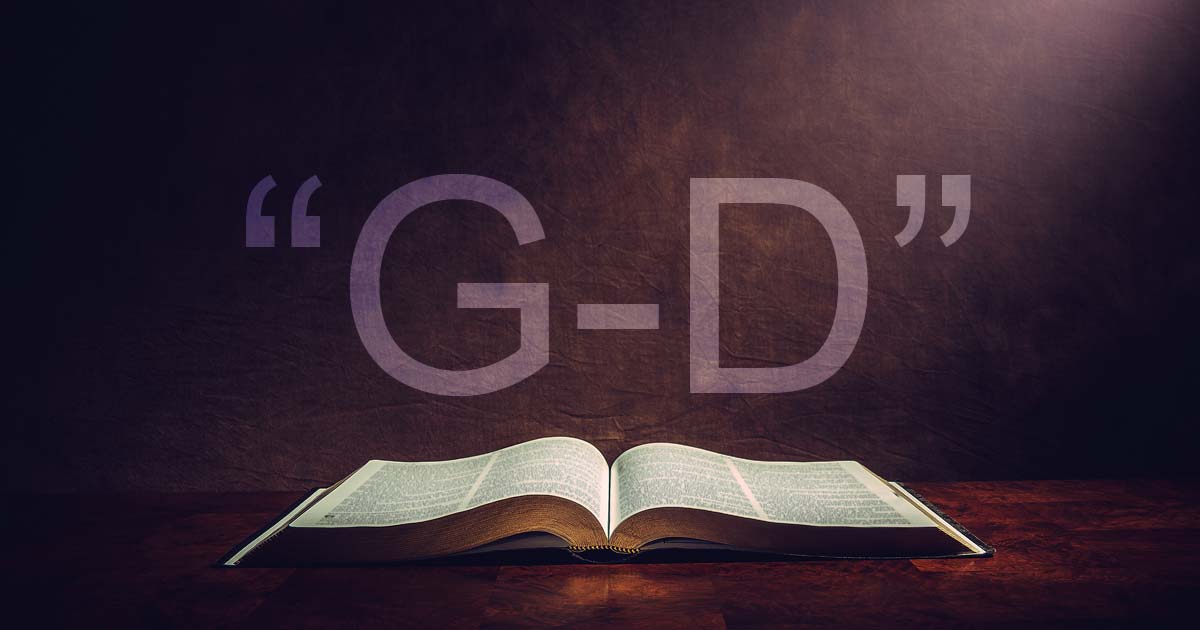
“G-D” and the Mystery of the Dash
Have you ever wondered why the Jewish people and some modern authors use the format “G-D” when referring to “God” in their writing? I believe the answer to this holds a teachable moment for the church, and by extension, for you.
Did you know that when Mel Gibson produced “The Passion of the Christ” he chose to have the actors speak the language of that time—Hebrew, Aramaic, and Latin—and used subtitles, instead of having the actors speak in English? Others counseled him that this would be a bad idea because it would get in the way of people watching the movie. They pleaded with him to just do it in English. But he didn’t listen to their advice. The movie went on to be one of the most successful Christian motion pictures of all time. If the movie had been produced in English, perhaps the words spoken would have sounded simple and lacked the power and influence that came with the original Hebrew, Aramaic, and Latin. It would have been just another Christian movie featuring Jesus’ crucifixion and resurrection. But by using the actual languages of the life and times of Jesus it added to the authenticity and the mystique of the Biblical story so that the audience ultimately had a different experience. I believe this was inspired by God Himself.
Today, you most often see that religious Jewish people are the ones who spell God as G-D. They do this because they are taught to respect and honor the One True God of Israel. Why omit the vowel “O?” This refers back to the tetragrammaton, which depicts in Hebrew the sacred name of the One True GOD of Israel given to Moses in the Torah. The tetragrammaton contains only the consonants of G-D’s sacred name and is expressed as Y-H-W-H. The vowels are missing so the actual pronunciation of His sacred name is not fully known. Scholars can only speculate. The sacred name refers specifically to the heavenly Father.
So what does this mean for us today? To answer that, you must first consider what unbelievers think when they hear us say that we “trust in God.” They may think we are referring to any of the many gods of this world: Krishna, Buddha, or some other. But when one sees “G-D” it unmistakably refers to the One and Only True G-D of Israel. That is powerful. There can be no confusing Him with any other false god of this earth. It unmistakably leads those unbelievers to consider the One and Only True God.
This is why throughout my new book, The Ancient Priestly Prayer of the Blessing, I refer to God as “G-D.” This is something I, and my publisher, struggled with at first. But I felt a strong leading, perhaps not unlike the inspiration that Mel Gibson felt when he decided to produce his film in Hebrew, Aramaic and Latin, that this would help everyone — including born-again believers — make a deeper connection with the Father.
This book introduces you to a new and life-changing relationship with the heavenly Father as He makes Himself available to you in a way that’s tangible. If you want to not just know about the Father, but actually know the Father in a supernatural, experiential way, this is a book for you.

Unfortunately, there is no Amplified Hebrew-to-English Bible in existence. To study the deeper meanings whether he English or the Greek, I had house resources like Strong’s Concordence, Interlinear Bible for Hebrew and Greek and study what other scholars have uncovered. I have researched this for 5 years.
I would love to see such a Bible, but it would not be able to be contained in one book, it would be volumes.
I can offer you the One New Man Bible, it’s not Amplified but it is a good translation which reflects the Hebrew Roots.
60.00 which includes shipping & handling within the US only.
You can send check or money order to New Day Pictures, PO Box 38330, Charlotte, NC 28278